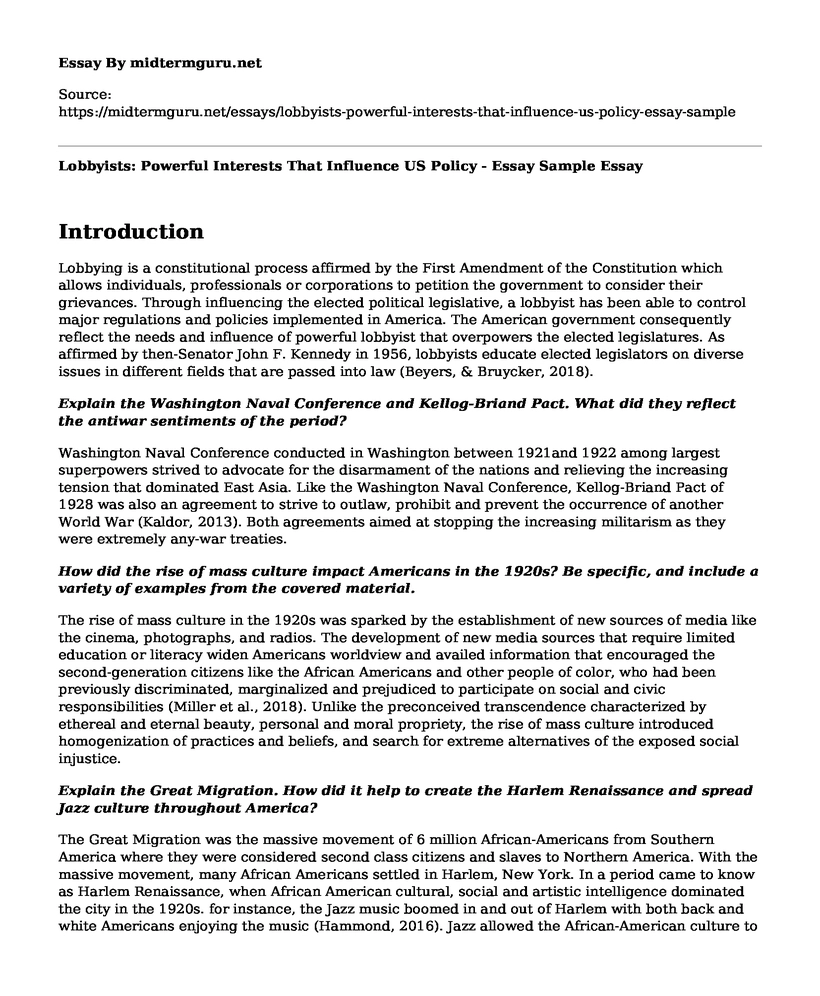Introduction
Lobbying is a constitutional process affirmed by the First Amendment of the Constitution which allows individuals, professionals or corporations to petition the government to consider their grievances. Through influencing the elected political legislative, a lobbyist has been able to control major regulations and policies implemented in America. The American government consequently reflect the needs and influence of powerful lobbyist that overpowers the elected legislatures. As affirmed by then-Senator John F. Kennedy in 1956, lobbyists educate elected legislators on diverse issues in different fields that are passed into law (Beyers, & Bruycker, 2018).
Explain the Washington Naval Conference and Kellog-Briand Pact. What did they reflect the antiwar sentiments of the period?
Washington Naval Conference conducted in Washington between 1921and 1922 among largest superpowers strived to advocate for the disarmament of the nations and relieving the increasing tension that dominated East Asia. Like the Washington Naval Conference, Kellog-Briand Pact of 1928 was also an agreement to strive to outlaw, prohibit and prevent the occurrence of another World War (Kaldor, 2013). Both agreements aimed at stopping the increasing militarism as they were extremely any-war treaties.
How did the rise of mass culture impact Americans in the 1920s? Be specific, and include a variety of examples from the covered material.
The rise of mass culture in the 1920s was sparked by the establishment of new sources of media like the cinema, photographs, and radios. The development of new media sources that require limited education or literacy widen Americans worldview and availed information that encouraged the second-generation citizens like the African Americans and other people of color, who had been previously discriminated, marginalized and prejudiced to participate on social and civic responsibilities (Miller et al., 2018). Unlike the preconceived transcendence characterized by ethereal and eternal beauty, personal and moral propriety, the rise of mass culture introduced homogenization of practices and beliefs, and search for extreme alternatives of the exposed social injustice.
Explain the Great Migration. How did it help to create the Harlem Renaissance and spread Jazz culture throughout America?
The Great Migration was the massive movement of 6 million African-Americans from Southern America where they were considered second class citizens and slaves to Northern America. With the massive movement, many African Americans settled in Harlem, New York. In a period came to know as Harlem Renaissance, when African American cultural, social and artistic intelligence dominated the city in the 1920s. for instance, the Jazz music boomed in and out of Harlem with both back and white Americans enjoying the music (Hammond, 2016). Jazz allowed the African-American culture to spread in the only-white communities with the establishment of the Cotton Club. Therefore, the Great Migration of African Americans to North America propelled the Harlem Renaissance and Jazz culture in the United States.
Why was Prohibition referred to as the "noble experiment?" How did it fail in its purpose?
The National Prohibition enacted by President Herbert Hoover between 1920 and 1933 was referred to a noble course because it undertook to eradicate alcohol abuse, keep families together, decrease prevalent crime and corruption, render solution to social problems and improve hygiene and health in America. However, despite being an agreed-upon strategy. However, the prohibition mainly of alcohol failed due to the repealed of the 18th Amendment to the Constitution in 1933 by the 21st Amendment which canceled the 18th amendments that prohibited as the 21st Amendment allowed importation and exportation of alcohol hence it was difficult and unconstitutional to prohibit alcohol consumption (Snow, 2017).
References
Beyers, J., & De Bruycker, I. (2018). Lobbying makes (strange) bedfellows: explaining the formation and composition of lobbying coalitions in EU legislative politics. Political Studies, 66(4), 959-984.
Hammond, P. (2016). Black Faced, Jazz Shaped: Race and American Popular Culture 1830-1930. Journal of Liberal Arts Thammasat University, 16(1), 24-41.
Kaldor, M. (2013). New and old wars: Organised violence in a global era. John Wiley & Sons.
Miller, A. L., Berlo, J. C., Wolf, B. J., & Roberts, J. L. (2018). American Encounters: Art, History, and Cultural Identity.
Snow, N. A. (2017). Alcohol Prohibition. Encyclopedia of Law and Economics, 1-2.
Cite this page
Lobbyists: Powerful Interests That Influence US Policy - Essay Sample. (2023, Jan 23). Retrieved from https://midtermguru.com/essays/lobbyists-powerful-interests-that-influence-us-policy-essay-sample
If you are the original author of this essay and no longer wish to have it published on the midtermguru.com website, please click below to request its removal:
- Research Paper on Blood Spatter Interpretation
- Article Analysis Essay on "Jefferson and Slavery" and "Jefferson and the Character Issue"
- Congress's Role in Abolishing Slavery in US - Essay Sample
- School Reforms: Examining the Impact of Societal Trends - Research Paper
- Comparing Obama and Isocrates's Speech - Essay Sample
- Albert Einstein: Economics Innovator & Explainer of Socialism - Essay Sample
- Australian Federal Police Raids on Media: Justified? - Essay Sample







